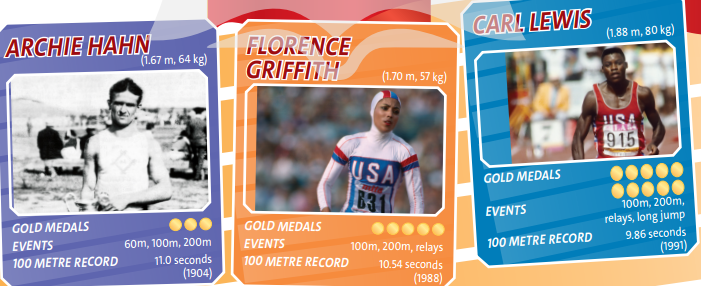Tiếng Anh 7 Unit 5 Language focus: Making comparisons1. Complete the sentences with the words from the reading text on page 60. 2. Look again at exercise 1, then complete the rules with like, different from, as … as. 3. Look at the information about the athletes. Then complete sentences 1-5 using comparative forms of the adjectives. 4. Complete the sentences with like, different from, as … as. 5. USE IT! Work in pairs. Compare opinions about the things in box B using comparative and superlative forms of the adjectives in box A. Finished? Make c Quảng cáo
Lựa chọn câu để xem lời giải nhanh hơn
Bài 1 1. Complete the sentences with the words from the reading text on page 60. (Hoàn thành các câu với các từ trong bài đọc ở trang 60.) 1 You should practise bodybuilding regularly and have a good diet ………… this. 2 You won’t look ………… a famous bodybuilder. 3 Can I jump ………… NBA stars? 4 You cannot if you do not eat………… calories ………… them. Lời giải chi tiết:
1 You should practise bodybuilding regularly and have a good diet like this. (Bạn nên tập thể hình thường xuyên và có chế độ ăn uống tốt như thế này. 2 You won’t look different a famous bodybuilder. (Trông bạn sẽ không khác một vận động viên thể hình nổi tiếng.) 3 Can I jump high as NBA stars? (Tôi có thể nhảy cao như những ngôi sao NBA không?) 4 You cannot if you do not eat as many calories as them. (Bạn không thể nếu bạn không ăn nhiều calo như họ.) Bài 2 2. Look again at exercise 1, then complete the rules with like, different from, as … as. (Xem lại bài tập 1, sau đó hoàn thành các quy tắc với like, different from, as… as.)
Lời giải chi tiết:
Bài 3 3.Look at the information about the athletes. Then complete sentences 1-5 using comparative forms of the adjectives. (Nhìn vào thông tin về các vận động viên. Sau đó, hoàn thành các câu 1-5 bằng cách sử dụng các hình thức so sánh của các tính từ.) SPORTING ACHIEVEMENTS OLYMPIC GREATS
Florence / Archie (fast) Florence was faster than Archie. (Florence nhanh hơn Archie.) 1 Archie / Carl (fast) 2 Carl / Florence (heavy) 3 Carl / Archie (good) 4 Archie / Florence (tall) 5 Archie / Carl (short) Lời giải chi tiết: 1 Archie wasn’t faster than Carl. (Archie không nhanh hơn Carl.) 2 Carl was heavier than Florence. (Carl nặng hơn Florence.) 3 Carl was better than Archie. (Carl tốt hơn Archie.) 4 Archie wasn’t taller than Florence. (Archie không cao hơn Florence.) 5 Archie was shorter than Carl. (Archie thấp hơn Carl.) Bài 4 4.Complete the sentences with like, different from, as … as. (Hoàn thành câu vớilike, differentfrom, as … as.) 1 Mandy doesn’t play tennis ……. well……. her sister. 2 This art museum is definitely……. the historical museum. 3 Do you think learning Spanish is……. difficult ……. learning German? 4 That big animal over there looks……. an elephant. 5 Lan is 1.62 metres tall, but I’m 1.70 metrestall. Her height is……. mine. Lời giải chi tiết:
1 Mandy doesn’t play tennis as well as her sister. (Mandy không chơi quần vợt tốt như chị gái của cô ấy.) 2 This art museum is definitely different from the historical museum. (Bảo tàng nghệ thuật này chắc chắn khác với bảo tàng lịch sử.) 3 Do you think learning Spanish is as difficult as learning German? (Bạn có nghĩ rằng học tiếng Tây Ban Nha khó như học tiếng Đức không?) 4 That big animal over there looks like an elephant. (Con vật to lớn kia trông giống như một con voi.) 5 Lan is 1.62 metres tall, but I’m 1.70 metrestall. Her height is different from mine. (Lan cao 1,62 mét, nhưng tôi cao 1,70 mét. Chiều cao của cô ấy khác với tôi.) Bài 5 5. USE IT! Work in pairs. Compare opinions about the things in box B using comparative and superlative forms of the adjectives in box A. (THỰC HÀNH! Làm việc theo cặp. So sánh ý kiến về những thứ trong hộp B bằng cách sử dụng các hình thức so sánh hơn và so sánh nhất của các tính từ trong hộp A.)
I think that Manchester United is a better team than Manchester City. (Tôi nghĩ rằng Manchester United là đội tốt hơn Manchester City.) Really? I think Arsenal is the best team. (Thật không? Tôi nghĩ Arsenal là đội tốt nhất.) Phương pháp giải:
Lời giải chi tiết: A: I think that a mosquito is a more dangerous animal than a dog. (Tôi nghĩ rằng muỗi là một loài động vật nguy hiểm hơn chó.) B: I agree with you. (Tôi đồng ý với bạn.) A: For me, history is a more boring subject than English. (Đối với tôi, lịch sử là một môn học nhàm chán hơn tiếng Anh.) B: Really? I think Chemistry is the most boring subject. (Thật không? Tôi nghĩ Hóa học là môn học nhàm chán nhất.) A: In my opinion, Nha Trang is a more interesting city than Hoi An. (Theo tôi, Nha Trang là một thành phố thú vị hơn Hội An.) B: Well, I think Da Lat is the most interesting city. (À, tôi nghĩ Đà Lạt là thành phố thú vị nhất.) A: I believe that salad is healthier food than meat. (Tôi tin rằng salad là thực phẩm lành mạnh hơn thịt.) B: Sure! ( Chắc chắn rồi!) Finished? Finished? Make comparisons between two famous athletes you know well. Then compare with a partner. (Bạn đã hoàn thành? So sánh giữa hai vận động viên nổi tiếng mà bạn biết rõ. Sau đó so sánh với bạn của bạn.)
Lời giải chi tiết: 1.Ronaldo is older than Messi. (Ronaldo lớn tuổi hơn Messi.) 2. Messi is shorter than Ronaldo. (Messi thấp hơn Ronaldo.) 3. Ronaldo is heavier than Messi. (Ronaldo nặng hơn Messi.) 4.Messi has won the Golden Ball’ award two times more than Ronaldo. (Messi đã giành được danh hiệu Quả bóng vàng nhiều hơn Ronaldo hai lần.)
|























Danh sách bình luận